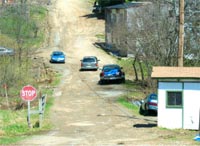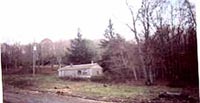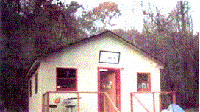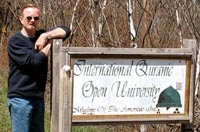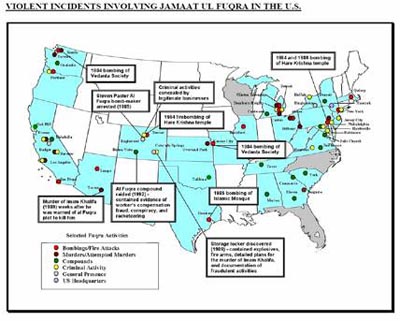Brothers Charged in Terror Plot - Illegally in U.S. 23years
FOXNEWS.COM HOME > U.S.
Brothers Charged in Terror Plot Lived Illegally in U.S. for 23 Years
Wednesday, May 09, 2007
Brothers Eljvir Duka, left, and Shain Duka are seen in an artist's drawing during a court appearance at the U.S. District Courthouse in Camden, N.J.
FORT DIX, N.J.  Three brothers charged in the alleged Fort Dix terror plot have been living illegally in the U.S. for more than 23 years and were accepted as Americans by neighbors and friends who had no idea they would scheme to attack military bases and slaughter GIs.
A federal law enforcement source confirmed to FOX News that the three  Dritan "Anthony" or "Tony" Duka, 28; Shain Duka, 26; and Eljvir "Elvis" Duka, 23  also accumulated 19 traffic citations, but because they operated in "sanctuary cites," where law enforcement does not routinely report illegal immigrants to homeland security, none of the tickets raised red flags.
The brothers entered the United States near Brownsville, Texas, in 1984, the source said, which would put their ages at 1 to 6 when they crossed the border.
The source said there is no record of them entering by way of a regular border crossing, so they are investigating whether they were smuggled into the country.
The brothers plus three other suspects in the alleged plot  Mohamad Ibrahim Shnewer, 22; Serdar Tatar, 23; and, Agron Abdullahu, 24  were ordered held without bail for a hearing Friday.
Five were charged with conspiracy to kill U.S. military personnel; the sixth, Abdullahu, was charged with aiding and abetting illegal immigrants in obtaining weapons.
Four of the arrested men were born in the former Yugoslavia, one was born in Jordan and one came from Turkey, authorities said. Three were in the United States illegally; two had green cards allowing them to stay in this country permanently; and the sixth is a U.S. citizen.
Federal investigators are now checking whether the latter three lied on their immigration paperwork to remain in the United States.
One drove a cab, three were roofers. Another worked at a 7-Eleven and a sixth at a supermarket. Their alleged plot to attack Fort Dix was foiled by another blue-collar worker: a video store clerk.
The foreign-born Muslims are accused of planning to assault the Army base and slaughter scores of U.S. soldiers with automatic weapons and rocket-propelled grenades.
The unidentified clerk is being credited with tipping off authorities in January 2006 after one of the suspects asked him to transfer a video to DVD that showed 10 men shooting weapons at a firing range and calling for jihad, prosecutors said.
"If we didn't get that tip," said U.S. Attorney Christopher Christie, "I couldn't be sure what would happen." FBI agent J.P. Weis called the clerk the "unsung hero" of the case.
Authorities said there was no direct evidence connecting the men to any international terror organizations such as Al Qaeda. But several of them said they were ready to kill and die "in the name of Allah," prosecutors said in court papers.
Weis said the U.S. is seeing a "brand-new form of terrorism," involving smaller, more loosely defined groups that may not be connected to Al Qaeda but are inspired by its ideology.
"These homegrown terrorists can prove to be as dangerous as any known group, if not more so. They operate under the radar," Weis said.
One of the suspects, Tatar, worked at his father's pizzeria  Super Mario's Restaurant  in Cookstown and made deliveries to the base, using the opportunity to scout out Fort Dix for an attack, authorities said.
"Clearly, one of the guys had an intimate knowledge of the base from having been there delivering pizzas," Christie said.
Tatar's father, Muslim Tatar, 54, said the accusations against his son were hard to accept.
"He is not a terrorist. I am not a terrorist," he told The Star-Ledger of Newark.
The elder Tatar told ABCNews he had gotten no indication his son harbored a deep hatred of the United States.
"I came here from Turkey in 1992, and this is my country. I love this country," Muslim Tatar told ABC.
FOX News has also learned that there were 19 traffic citations against the Duka brothers, but according to a federal law enforcement source, because they operated in so-called "sanctuary cites," where law enforcement does not routinely tell the Homeland Security Department about illegal immigrants in their towns, none of the tickets raised red flags.
The group often watched terror training videos, clips featuring Usama bin Laden, a tape containing the last will and testament of some of the Sept. 11 hijackers, and tapes of armed attacks on U.S. military personnel, authorities said.
The men trained by playing paintball in the woods in New Jersey and taking target practice at a firing range in Pennsylvania's Pocono Mountains, where they had rented a house, authorities said.
"We believe they are their own cell," said Christie. "They are inspired by international terror organizations. I believe they saw themselves as part of that."
Fort Dix last was in the international spotlight in 1999, when it sheltered more than 4,000 ethnic Albanian refugees during the NATO bombing campaign against Yugoslavia.
In addition to plotting the attack on Fort Dix, the defendants spoke of assaulting a Navy installation in Philadelphia during the annual Army-Navy football game and conducted surveillance at other military installations in the region, prosecutors said.
After the video clerk's tip, investigators said they infiltrated the group with two informants and bided their time while they secretly recorded the defendants.
The six were arrested Monday night trying to buy AK-47 assault weapons, M-16s and other weapons from an FBI informant, authorities said. It was not clear when the alleged attack was to take place.
"We had a group that was forming a platoon to take on an army. They identified their target, they did their reconnaissance. They had maps. And they were in the process of buying weapons. Luckily, we were able to stop that," said Weis.
The arrests renewed worries among New Jersey's Muslim community. Hundreds of Muslim men from New Jersey were rounded up and detained in the months after the 2001 terror attacks, but none were connected to that plot.
"If these people did something, then they deserve to be punished to the fullest extent of the law," said Sohail Mohammed, a lawyer who represented scores of detainees after the Sept. 11 attacks. "But when the government says `Islamic militants,' it sends a message to the public that Islam and militancy are synonymous."
"Don't equate actions with religion," he said.
Mario Tummillo lives near Tatar's father in Cookstown and said he worked with Tatar at the pizza parlor. Tummillo, 20, described Tatar as a religious man who "wasn't violent at all."
The restaurant's chef, Joseph Hofflinger, 35, quit after learning the owner was the father of one of the suspects.
"My son is in the 82nd Airborne," Hofflinger told ABC. "I won't work for a place that supports terrorism so I'm out."
FOX News' Catherine Herridge and The Associated Press contributed to this report.
source: http://www.foxnews.com/story/0,2933,270892,00.html
.
FOXNEWS.COM HOME > U.S.
Brothers Charged in Terror Plot Lived Illegally in U.S. for 23 Years
Wednesday, May 09, 2007
Brothers Eljvir Duka, left, and Shain Duka are seen in an artist's drawing during a court appearance at the U.S. District Courthouse in Camden, N.J.
FORT DIX, N.J.  Three brothers charged in the alleged Fort Dix terror plot have been living illegally in the U.S. for more than 23 years and were accepted as Americans by neighbors and friends who had no idea they would scheme to attack military bases and slaughter GIs.
A federal law enforcement source confirmed to FOX News that the three  Dritan "Anthony" or "Tony" Duka, 28; Shain Duka, 26; and Eljvir "Elvis" Duka, 23  also accumulated 19 traffic citations, but because they operated in "sanctuary cites," where law enforcement does not routinely report illegal immigrants to homeland security, none of the tickets raised red flags.
The brothers entered the United States near Brownsville, Texas, in 1984, the source said, which would put their ages at 1 to 6 when they crossed the border.
The source said there is no record of them entering by way of a regular border crossing, so they are investigating whether they were smuggled into the country.
The brothers plus three other suspects in the alleged plot  Mohamad Ibrahim Shnewer, 22; Serdar Tatar, 23; and, Agron Abdullahu, 24  were ordered held without bail for a hearing Friday.
Five were charged with conspiracy to kill U.S. military personnel; the sixth, Abdullahu, was charged with aiding and abetting illegal immigrants in obtaining weapons.
Four of the arrested men were born in the former Yugoslavia, one was born in Jordan and one came from Turkey, authorities said. Three were in the United States illegally; two had green cards allowing them to stay in this country permanently; and the sixth is a U.S. citizen.
Federal investigators are now checking whether the latter three lied on their immigration paperwork to remain in the United States.
One drove a cab, three were roofers. Another worked at a 7-Eleven and a sixth at a supermarket. Their alleged plot to attack Fort Dix was foiled by another blue-collar worker: a video store clerk.
The foreign-born Muslims are accused of planning to assault the Army base and slaughter scores of U.S. soldiers with automatic weapons and rocket-propelled grenades.
The unidentified clerk is being credited with tipping off authorities in January 2006 after one of the suspects asked him to transfer a video to DVD that showed 10 men shooting weapons at a firing range and calling for jihad, prosecutors said.
"If we didn't get that tip," said U.S. Attorney Christopher Christie, "I couldn't be sure what would happen." FBI agent J.P. Weis called the clerk the "unsung hero" of the case.
Authorities said there was no direct evidence connecting the men to any international terror organizations such as Al Qaeda. But several of them said they were ready to kill and die "in the name of Allah," prosecutors said in court papers.
Weis said the U.S. is seeing a "brand-new form of terrorism," involving smaller, more loosely defined groups that may not be connected to Al Qaeda but are inspired by its ideology.
"These homegrown terrorists can prove to be as dangerous as any known group, if not more so. They operate under the radar," Weis said.
One of the suspects, Tatar, worked at his father's pizzeria  Super Mario's Restaurant  in Cookstown and made deliveries to the base, using the opportunity to scout out Fort Dix for an attack, authorities said.
"Clearly, one of the guys had an intimate knowledge of the base from having been there delivering pizzas," Christie said.
Tatar's father, Muslim Tatar, 54, said the accusations against his son were hard to accept.
"He is not a terrorist. I am not a terrorist," he told The Star-Ledger of Newark.
The elder Tatar told ABCNews he had gotten no indication his son harbored a deep hatred of the United States.
"I came here from Turkey in 1992, and this is my country. I love this country," Muslim Tatar told ABC.
FOX News has also learned that there were 19 traffic citations against the Duka brothers, but according to a federal law enforcement source, because they operated in so-called "sanctuary cites," where law enforcement does not routinely tell the Homeland Security Department about illegal immigrants in their towns, none of the tickets raised red flags.
The group often watched terror training videos, clips featuring Usama bin Laden, a tape containing the last will and testament of some of the Sept. 11 hijackers, and tapes of armed attacks on U.S. military personnel, authorities said.
The men trained by playing paintball in the woods in New Jersey and taking target practice at a firing range in Pennsylvania's Pocono Mountains, where they had rented a house, authorities said.
"We believe they are their own cell," said Christie. "They are inspired by international terror organizations. I believe they saw themselves as part of that."
Fort Dix last was in the international spotlight in 1999, when it sheltered more than 4,000 ethnic Albanian refugees during the NATO bombing campaign against Yugoslavia.
In addition to plotting the attack on Fort Dix, the defendants spoke of assaulting a Navy installation in Philadelphia during the annual Army-Navy football game and conducted surveillance at other military installations in the region, prosecutors said.
After the video clerk's tip, investigators said they infiltrated the group with two informants and bided their time while they secretly recorded the defendants.
The six were arrested Monday night trying to buy AK-47 assault weapons, M-16s and other weapons from an FBI informant, authorities said. It was not clear when the alleged attack was to take place.
"We had a group that was forming a platoon to take on an army. They identified their target, they did their reconnaissance. They had maps. And they were in the process of buying weapons. Luckily, we were able to stop that," said Weis.
The arrests renewed worries among New Jersey's Muslim community. Hundreds of Muslim men from New Jersey were rounded up and detained in the months after the 2001 terror attacks, but none were connected to that plot.
"If these people did something, then they deserve to be punished to the fullest extent of the law," said Sohail Mohammed, a lawyer who represented scores of detainees after the Sept. 11 attacks. "But when the government says `Islamic militants,' it sends a message to the public that Islam and militancy are synonymous."
"Don't equate actions with religion," he said.
Mario Tummillo lives near Tatar's father in Cookstown and said he worked with Tatar at the pizza parlor. Tummillo, 20, described Tatar as a religious man who "wasn't violent at all."
The restaurant's chef, Joseph Hofflinger, 35, quit after learning the owner was the father of one of the suspects.
"My son is in the 82nd Airborne," Hofflinger told ABC. "I won't work for a place that supports terrorism so I'm out."
FOX News' Catherine Herridge and The Associated Press contributed to this report.
source: http://www.foxnews.com/story/0,2933,270892,00.html
.





